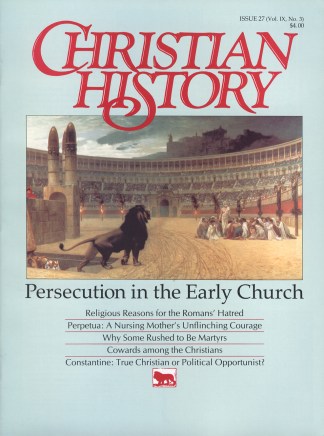The Christians’ triumph over the pagan Empire brought its own problems.
Constantine’s imperial patronage did, of course, assure Christianity’s victory. And the Emperor summoned the first general councils of the church, at in 314 and Nicea in 325.
The imperial presence, however, had its less happy side. The persecution under Diocletian and his colleagues had caused schism in the North African church. In 312 the North African majority rejected Caecilian as bishop of Carthage, on the grounds that he had shown insensitivity toward imprisoned confessors, and that he allowed himself to be Consecrated by a bishop who (wrongly, as it turned out) had handed over the Scriptures to the authorities. Unfortunately for the objectors, Emperor Constantine supported Caecilian, and his lead was followed by the rest of Christendom. The Emperor’s intervention in the quarrel thus caused a deep and permanent schism. In addition, North Africa lost its role as a powerhouse of western Christianity until St. Augustine’s time almost a century later.
Further, too soon the victorious church itself turned persecutor—against the remnants of paganism and dissenters in its own ranks. By the end of the fourth century, for example, when Catholic Christianity had become the established religion of the Empire, Augustine invoked state aid against the Donatists. The way was opened for the persecution of religious minorities that has marred the church’s history to our own day. Even so, the survival of the church in the first three centuries was a historic athievement.
Dr. William H. C. Frend, clerk in holy orders for the Diocese of Peterborough (U.K.), is professor emeritus of ecclesiastical history at Glasgow University and author of Martyrdom and Persecution in the Early Church (Oxford: Blackwell; New York: New York University, 1965).
Copyright © 1990 by the author or Christianity Today/Christian History magazine.Click here for reprint information on Christian History.









